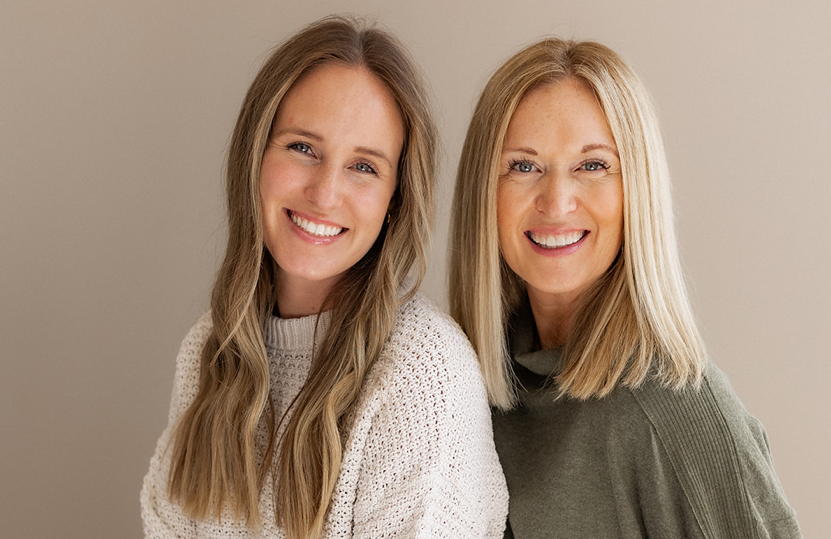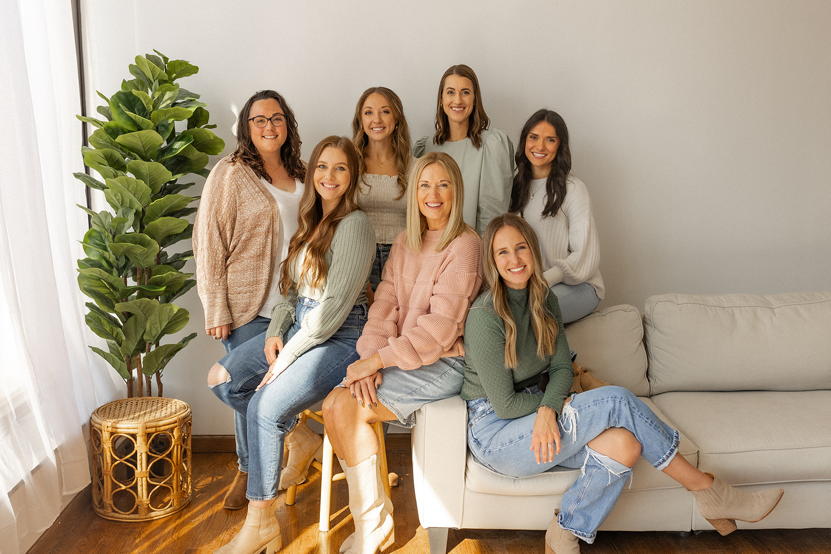In today’s fast-paced world, mental health stressors weigh heavily on the hearts and minds of women and children alike. Whether it’s the soaring cost of living, the turmoil of politics, or the heartbreaking news of violence hitting close to home, the toll on our collective well-being is undeniable. In this whirlwind, self-care often takes a backseat for many adults, and the stigma surrounding emotional expression can leave us at war in a silent battle with our minds.
For therapists like Kelsey Foss and Donna Washington, who co-founded The Counseling Collaborative for women, the reluctance of potential clients to seek therapy is a common hurdle. “We talk to people all the time about what’s making it hard (to seek therapy),” Kelsey said. “A lot of times it is their beliefs and the stigma around it. This might be the first time in a long time that they are focusing on themselves and that can feel really foreign and different and uncomfortable.”

Kelsey Foss and Donna Washington
According to local mental health professional Carron Montgomery, nurturing mental health isn’t just a personal pursuit — it’s an essential piece of well-being for ourselves and our children. Carron is a mental health clinician, trauma specialist, author, speaker, and community advocate. She says raising a generation of resilient and balanced individuals begins at home. While parents navigate their own emotional landscapes, children pick up on those feelings and can be caught in what Carron calls a “riptide,” which she refers to, broadly, as the emotional current of the world. Feelings, Carron says, are contagious. “We need to support women having (mental health) support so they can have the skills to not have a riptide that’s out of control and is felt by their kids.”
Carron’s illustrated children’s book, Invisible Riptide, serves as a discussion guide to bridge the gap in knowledge and empower parents to have conversations about stressors. It’s meant to teach parents, as much as their kids, to create a common language to start those conversations and give parents the confidence to do so. The illustrated, all-ages book offers coping mechanisms and tools for communication to support children’s emotional development. “What I’m seeing is there’s a gap in knowledge and confidence to have conversations (about stressors) that now have become part of our daily life,” Carron said. “You can’t know what you haven’t been taught, and our generation wasn’t really taught about the purpose of feelings or about how to cope with mental health in a healthy way because we were more of a silent generation.”

(Front row) Madison Graham, Donna Washington, and Kelsey Foss (back row) Caitlin Gable, Grace Scott, Tara Westerhouse, and Carlyn Timp
Throughout their careers, Kelsey and Donna have come to recognize that different generations, walks of life, and countries grapple with distinct mental health themes. Donna stressed the importance for women to address emotional needs. She says each generation has a unique way of addressing stress and self-care – whether it’s to talk about it, or suppress the feelings and power through. Donna also emphasized the need for a shift away from the “pushing through” mentality and the idea that one can be everything for everyone all the time. “My generation was taught, ‘Push through, you’re fine,’” Donna said. “To ‘push through’ is not okay anymore.” Instead, she advocates for vulnerability, asking for help, and acknowledging that it’s okay not to do it all alone.
Kelsey and Donna have also seen a trend in many women seeking the most support on topics surrounding parenting, motherhood, and the pervasive tendency to compare oneself to others in terms of the “right” way to navigate these roles. Kelsey said, “We talk a lot about perfectionism and pleasing people. And then, of course, just navigating mood, energy, and motivation, and caring for yourself in ways that feel balanced. It can feel selfish, and so we’re navigating, ‘What does self-care actually mean?’” Donna said, “What people are seeking is to be more connected to themselves and more connected to other people. Lack of communication leads to disconnection, which leads to feelings of depression and anxiety.”
 From Carron’s perspective, moms in particular need mental health support and education. “Parents now – especially women with young children – do not have the support they need to stay regulated,” she said. “I think there’s anxiety about having anxiety and then your kids feeling the anxiety, but not having the time and the tools.” She also takes into account the increase in violence, noting how difficult it is for parents, and especially moms, to find the time to process their own emotions and engage in the self-care that is needed. Unresolved emotions can affect a child’s emotional processing. “A lot of times I run into parents struggling because they don’t feel equipped, so they don’t have the conversation,” Carron said. “We don’t have as much time for that work and those organic conversations (don’t happen) just from the fast-paced society we’re living in – from people working, getting home later, and kids being involved in so many activities.”
From Carron’s perspective, moms in particular need mental health support and education. “Parents now – especially women with young children – do not have the support they need to stay regulated,” she said. “I think there’s anxiety about having anxiety and then your kids feeling the anxiety, but not having the time and the tools.” She also takes into account the increase in violence, noting how difficult it is for parents, and especially moms, to find the time to process their own emotions and engage in the self-care that is needed. Unresolved emotions can affect a child’s emotional processing. “A lot of times I run into parents struggling because they don’t feel equipped, so they don’t have the conversation,” Carron said. “We don’t have as much time for that work and those organic conversations (don’t happen) just from the fast-paced society we’re living in – from people working, getting home later, and kids being involved in so many activities.”
In light of these perspectives, the journey towards mental wellness requires a collective effort, and women can lead the charge. By having open conversations, providing support, and bravely sharing our vulnerability with trusted people, we can create a healthier and more resilient community for ourselves and future generations. “Women haven’t always historically had a voice,” Kelsey said. “And so now that women are finding their voice, they’re empowering other people.” As a result of therapy, Kelsey hopes that more women can be less critical and more kind to themselves, to doubt themselves less and to be empowered. “When women feel well, they can better communicate and have those skills to pour out into the world and to their children and work,” she said. “And I think it will be amazing to see what happens the more that mental health and women learning those skills evolve over time.”
Featured in the March 23, 2024 issue of The Independent.
By Monica V. Reynolds